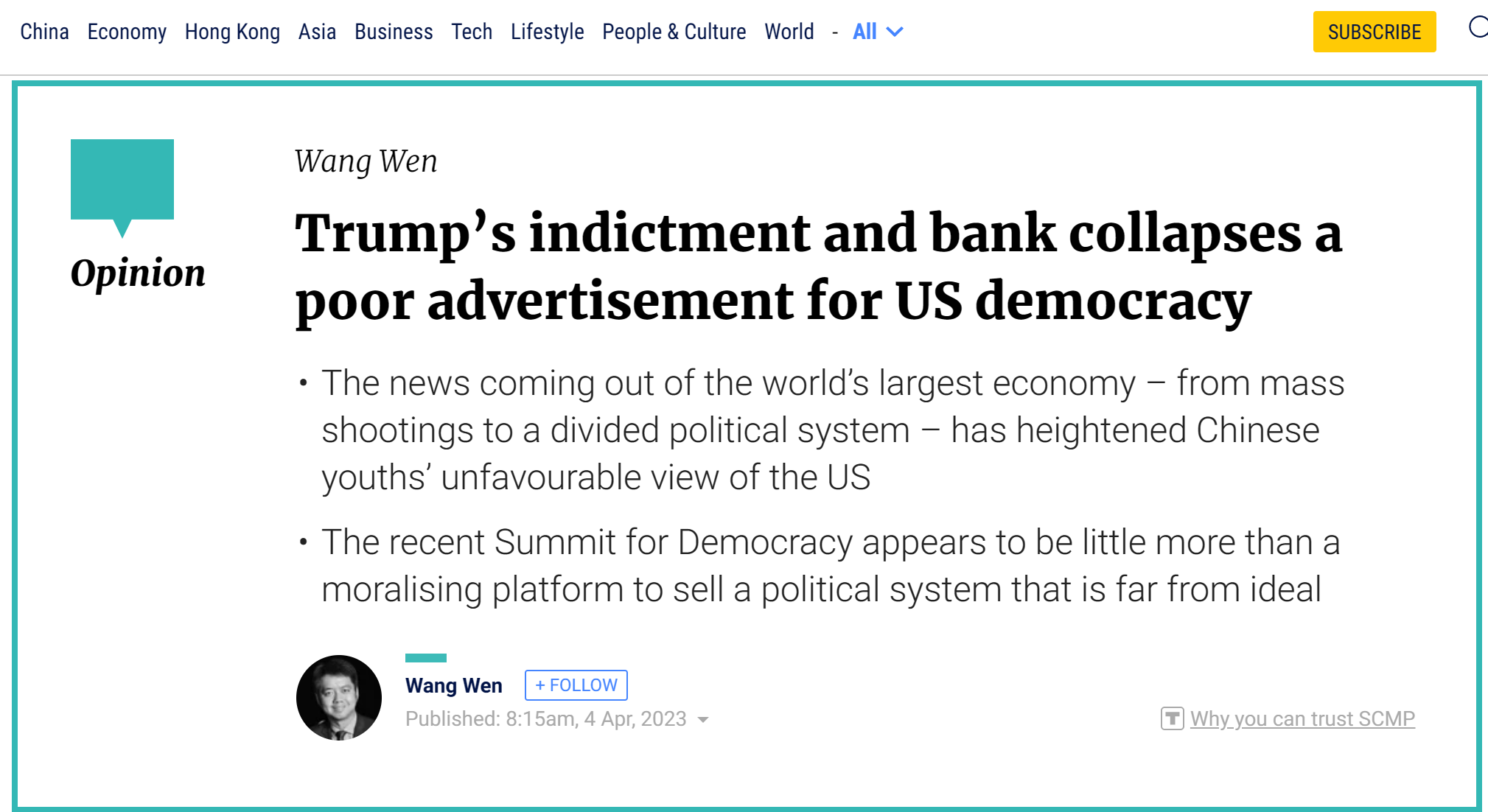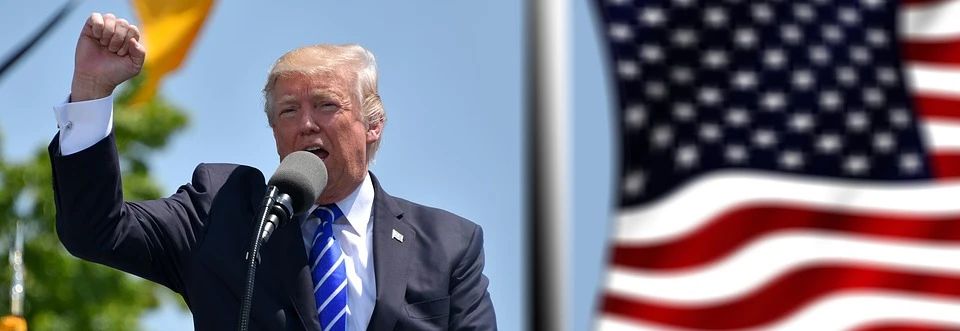发布时间:2023-04-06 作者: 王文
从中国人的角度来看,美国的所谓“民主峰会”只不过是一个道德平台,用来推动有缺陷的美国价值观,并将美国的政治制度作为唯一有效的制度进行推销。很明显,其意图是排斥中国,并在中美两国之间制造更深的楔子。
2023年4月4日,《南华早报》刊发中国人民大学重阳金融研究院执行院长、中美人文交流研究中心(教育部)王文主题为《特朗普的起诉书和银行倒闭是美国民主的糟糕广告》一文,讲述对近期美国全球民主峰会等一系列事件的中国看法。
从中国人的角度来看,美国的所谓“民主峰会”只不过是一个道德平台,用来推动有缺陷的美国价值观,并将美国的政治制度作为唯一有效的制度进行推销。很明显,其意图是排斥中国,并在中美两国之间制造更深的楔子。
本文字数约4000字,阅读需要6分钟。

本文刊于4月4日《南华早报》
摘 要
●来自世界最大经济体的消息——从大规模枪击事件到分裂的政治制度——加剧了中国年轻人对美国的负面看法
●最近的民主峰会似乎只不过是一个道德平台,用来推销一个远非理想的政治制度。

美国上周举行了第二次“民主峰会”,而中国人则是在等待对2016年选举日前唐纳德·特朗普代表美国前总统支付的封口费进行刑事调查的细节之余,嘲笑这种具有讽刺性的系列事件。这位前美国领导人应该为他在1月6日叛乱中的负面影响感到羞耻。
中国人不觉得讽刺美国的政治制度很有必要,也着实没有相关的言论弹药储备。在第一次世界大战结束时高喊“威尔逊总统万岁”的一代年轻人,以及1989年在天安门广场支持“为自由和民主而战”的理想主义一代,与今天的中国年轻人几乎没有相同之处。新一代年轻人已经开始认为,效仿美国民主没有任何好处。
本世纪降临在美国的许多政治、社会和军事上的不幸使我的学生们感到困惑和愤怒,尽管他们有时仍会对这个曾经令人嫉妒的国家感到忧虑。
亚伯拉罕·林肯的葛底斯堡演说,宣称“民有、民治、民享”的理想,长期以来一直是中国学者的灵感源泉。而现在,我们已经在哀悼这个破碎的、未实现的美国梦。
中国人仍然惊叹于美国的技术创新。我的许多学生们都对ChatGPT-4着迷,并钦佩特斯拉创始人埃隆·马斯克。然而,他们无法理解的是,一个拥有如此多高精尖技术和优秀产品的国家,其政治核心的状况却变得如此糟糕。
中国年轻人认为,美国的民主一团糟,因为它无法实现一个主要的民主原则:和平移交权力。他们看到,选举是通过惊人的金额赢得的,这些钱被用来向对手和中国投掷可恨的半真半假。他们看到美国的决策机构陷入僵局,其成员挑衅和愤怒。
许多中国人认为,美国对激烈言论交锋的关注是进步的障碍。在中国,互相“说垃圾话”的自由与其说是一种基本权利,不如说是一种丢脸的方式。中国人的话语自由是由礼仪决定的,而不是使批判性思维迟钝的高雅情绪。
美国人似乎骨子里就是虚伪的。他们支持自由,却限制女性选择结束意外怀孕的自由。
今年,美国已经发生的100多起大规模枪击事件,还充斥着警察对非裔美国人的暴行、“新闻自由”谎言,以及挑起和散布谣言的“自由”。许多中国人也无法理解美国所谓正义的、否认科学的极端基督教宗教信仰及其分裂影响。
世界上最富有的国家怎么可能有数以万计的自杀记录、吸毒过量和酒精性肝病造成的“绝望死亡”?我的学生们认为,或许是资本主义固有的缺乏关怀使美国走到了这一步。
当然,美国人已经看到了工业巨头如何在公共健康危机期间,在能源短缺时期甚至战争中积累利润。即使利益攸关方正在努力,但这个世界上最富有国家的领导人仍然无法团结起来提供普通民众负担得起的医疗保健。
美国前总统艾森豪威尔曾发出的“警惕国家被军工复合体接管”的预言,似乎已经实现。尽管许多人对美国及其军队进行了捶胸顿足式的道德谴责,但美国仍在战争上花费了数万亿美元。
现在,美国银行系统再次处于危机模式。但这不太可能成为缩小贫富差距的新措施的催化剂,贫富差距正在粉碎美国梦。
在美国充满麻烦和内部分裂的情况下,很难理解中国是如何在他们眼里变得如此妖魔化。这感觉像是一种策略,美国政治右翼和左翼已经找到了共同点。
欧亚集团基金会第四次年度国际民意调查发现,支持美式民主的中国受访者人数从2019年的44%下降到2022年的32%。极度不喜欢美国民主的中国受访者人数增加了一倍多,从2019年的5%增加到2022年的17%。
在我的年轻学生及他们的不少同龄人中,很少有人会同意美国式民主应该是中国的前进方向。
中国人批评美国民主并不意味着我们认为中国的制度是完美无缺的。中国人亲眼看到了我们尚未克服的许多挑战,以及需要修复的缺陷。中国的决策者和学者针对这些缺陷也在不断发出警示并积极改进,中国民主的高质量发展是提高生活质量和增强人民安全感的必要条件。
然而,当中国人关注美国的发展时,我们所思所想的并不是幸灾乐祸,而是对中国成就的自豪。数亿人摆脱了贫困,我们的城市变得安全。空气质量有所改善。对中国金融体系的信任让日常消费几乎不再使用纸币,因为每个人都在手机上使用电子支付应用程序。
从中国人的角度来看,美国的所谓“民主峰会”只不过是一个道德平台,用来推动有缺陷的美国价值观,并将美国的政治制度作为唯一有效的制度进行推销。很明显,其意图是排斥中国,并在中美两国之间制造更深的楔子。
我们只能希望美国有朝一日能够冷静下来,学会尊重他人。
以下为英文版
Trump’s indictment and bank collapses a poor advertisement for US democracy
By Wang Wen
· The news coming out of the world’s largest economy – from mass shootings to a divided political system – has heightened Chinese youths’ unfavourable view of the US
· The recent Summit for Democracy appears to be little more than a moralising platform to sell a political system that is far from ideal
The US staged the second Summit for Democracy last week. Chinese are chuckling at the irony as they await details of a criminal investigation into hush money paid on behalf of former US president Donald Trump before election day in 2016. The former American leader should also be ashamed of his role in the January 6 insurrection.
Chinese didn’t always feel the need, nor have the ammunition, to lampoon the US political system. However, the generation of young people who shouted “Long live President Wilson” at the end of World War I, and the idealistic generation who endorsed a “fight for freedom and democracy” in Tiananmen Square in 1989, have little in common with young Chinese people today who see no upside to emulating American democracy.
The many political, social and military misfortunes that have befallen the US this century have confused and outraged my students, even as they worry about the country that was once a source of envy.
Abraham Lincoln’s Gettysburg Address, declaring the ideal of a “a government of the people, by the people, for the people”, has long been a source of inspiration to Chinese scholars past and present. We now mourn this broken, unfulfilled American dream.
Chinese people still marvel at American technological innovation. Many of my students are fascinated by ChatGPT-4 and admire Tesla founder Elon Musk. Yet, it’s incomprehensible to them that a country with so much of everything has become so deeply divided at its core.
They see US democracy as being in a shambles as it can’t live up to a primary democratic principle: the peaceful transfer of power. They see elections won by staggering amounts money being used to sling hateful half-truths at opponents, and at China. They see US decision-making bodies gridlocked, their members defiant and angry.
Many Chinese people see the US preoccupation with fiery rhetoric as a roadblock to progress. In China, the freedom to say nasty things about one another is viewed not so much as a fundamental right, but as a way to lose face. Our freedom of discourse is dictated by decorum, not heightened emotion that dulls critical thinking.
There seems to be a fundamental hypocrisy in Americans championing freedom but curtailing women’s freedom to choose to end an unwanted pregnancy.
Then there are the more than 100 mass shootings already this year, police brutality against African-Americans, and the freedom of the “free press” to lie, provoke and spread rumours. Many Chinese can’t understand the righteous, science-denying extreme Christian religiosity in the US, and its divisive impact.
How is it possible that the world’s richest country records tens of thousands of “deaths of despair” due to suicide, drug overdose and alcoholic liver disease? My students might suggest the lack of caring inherent in capitalism brought the US to this point.
Surely, Americans see how the titans of industry are amassing profits during a health crisis, amid energy shortages and even war. Even as shareholders make hay, the elected leaders of the world’s wealthiest country can’t come together to provide affordable healthcare.
It seems that the takeover by the military-industrial complex that former president Dwight Eisenhower’s warned against has materialised. For all its moralising and chest-thumping about democracy, the US and its military have spent trillions of dollars on war.
Now the US banking system is once again in crisis mode. But this is unlikely to be a catalyst for new measures to narrow the wealth gap, which is crushing the American dream.
With all the trouble and strife in the US, it’s hard to understand how China has become the bogeyman. It feels like a ploy, one on which the US political right and left have found common ground.
The Eurasia Group Foundation’s fourth annual international public opinion survey found that the number of Chinese respondents who favour American-style democracy dropped from 44 per cent in 2019 to 32 per cent 2022. The number of Chinese respondents who strongly dislike American democracy more than doubled from 5 per cent in 2019 to 17 per cent in 2022.
Among my young students and contemporaries, very few would agree that American-style democracy should be the way forward for China.
Our criticism of American democracy doesn’t mean we think the Chinese system is flawless. We can see for ourselves the many challenges we haven’t yet overcome, and the deficiencies that need fixing. Chinese decision-makers and academics are constantly issuing warnings that high-quality development of Chinese democracy is required to improve quality of life and enhance people’s sense of security.
Yet, as we follow the developments in the US, we feel, not Schadenfreude, but pride in China’s achievements. Hundreds of millions have been lifted out of poverty and our cities are safe. Air quality has improved. Trust in our financial system has all but done away with paper money, as everyone uses e-payment apps on their phones.
From our perspective, the US’ Summit for Democracy is little more than a moralising platform to push flawed American values and sell the US political system as the only valid one. It’s clear intention is to ostracise China, and drive a deeper wedge between our two countries.
We can only hope the US will someday compose itself and learn to respect others.
(欢迎关注人大重阳新浪微博:@人大重阳 ;微信公众号:rdcy2013)